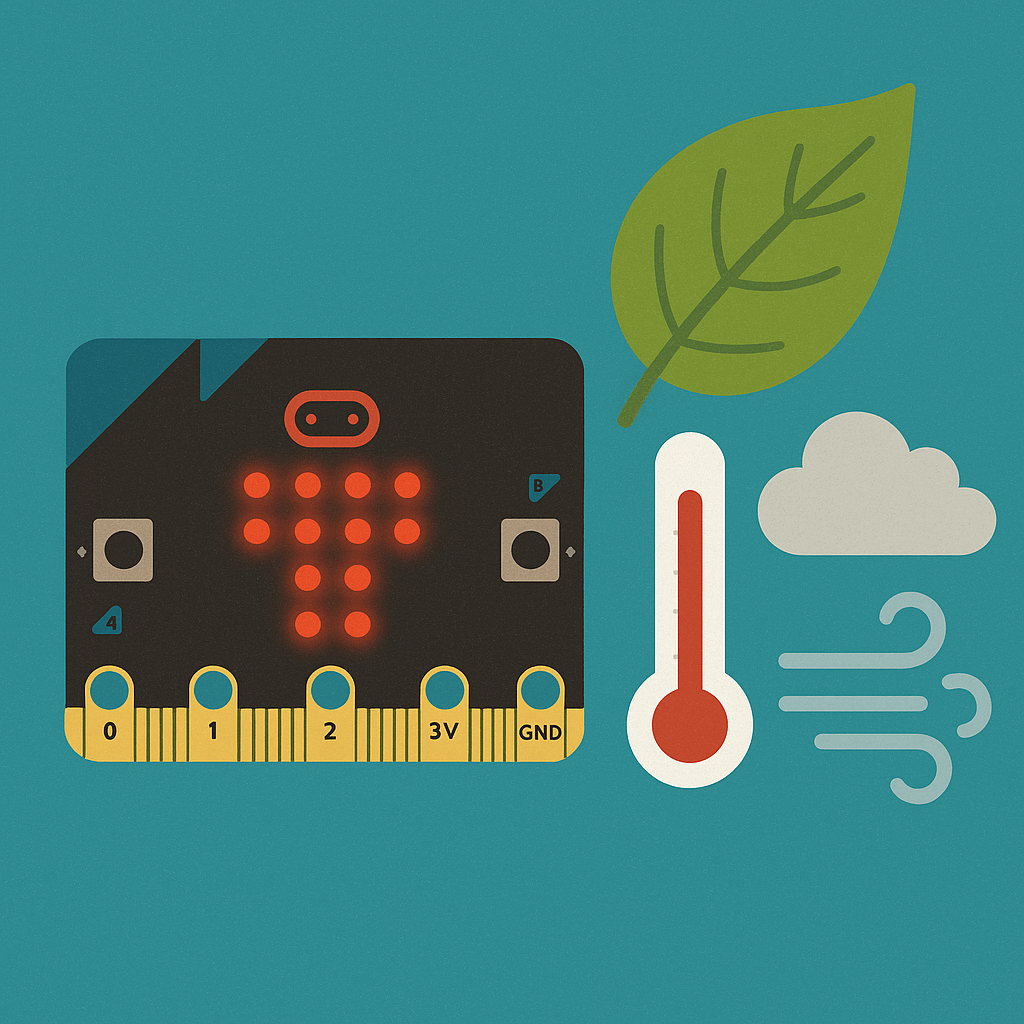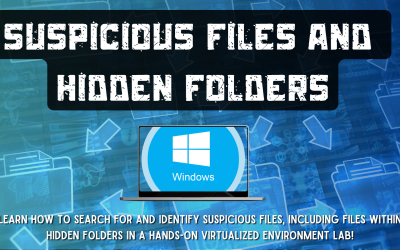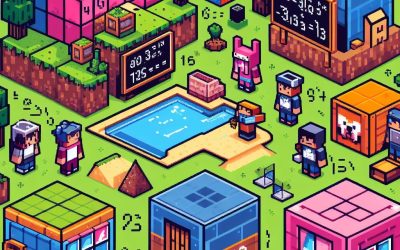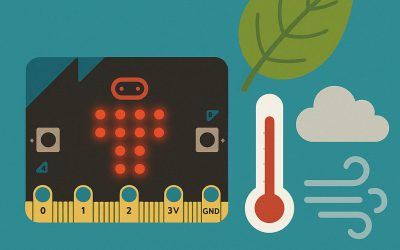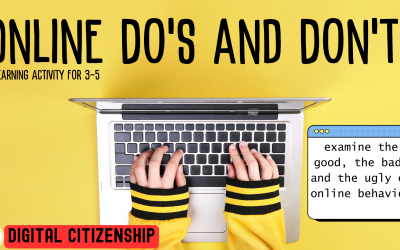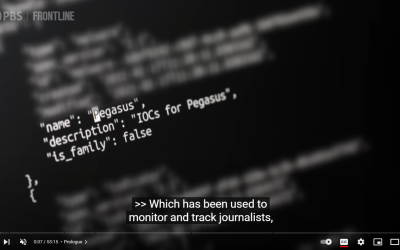Activity image generated with ChatGPT/DALL-E
Overview
This activity integrates data collection/analysis with physical computing. Students will program micro:bits to collect, graph and interpret environmental data. By combining technology with Math and Science, students develop digital skills while improving their numeracy and science literacy skills.
If you are unfamiliar or new to micro:bits and Microsoft MakeCode, please contact your district’s technology subject coordinator or email COE@gnb.ca for support with learning more or accessing micro:bits and its accessories. You may also want to explore this asynchronous course on the New Brunswick PLHub: Introduction to micro:bits
NB Curricular Connections
6-8 Mathematics
- Strand: Statistics and Probability
- Big Idea: Data Analysis
- Skill Descriptor:
- Grade 6:
- Collect and represent data
- Grade 7:
- Calculate measures of central tendency to solve problems
- Analyze linear relations of the forms shown below and compare graphs to solve problems.
- Grade 8:
- Compare and critique graphs and the presentation of data
- Analyze linear relations of the forms shown below and compare graphs to solve problems.
- Grade 6:
6-8 Technology
- Strand: Design Thinking Skills
- Big Idea: Problem Solving
- Skill Descriptor: Plan, execute and present a project within given parameters and with assistance.
- Strand: Information Technology Skills
- Big Idea: Devices
- Skill Descriptor: Integrate sensor input, computational algorithms, and output devices.
- Strand: Information Technology Skills
- Big Idea: Computational Practice
- Skill Descriptor: Apply basic coding skills to solve problems.
6-8 Science
- Strand: Scientific Literacy
- Big Idea: Investigation
- Skill Descriptor:
- Grade 6:
- Plan investigations to answer questions about relationships between and among variables observed in natural and technical sensory systems,
- Collect and represent data using tools and methods appropriate for investigations of natural and technical sensory systems.
- Grade 7:
- Plan investigations to answer questions about relationships between and among variables observed in matter and Earth surface processes.
- Collect and represent data using tools and methods appropriate for investigations of matter and Earth surface processes
- Grade 6:
- Strand: Scientific Literacy
- Big Idea: Sensemaking
- Skill Descriptor:
- Grade 6-8:
- Analyze and interpret qualitative and quantitative data to construct explanations and conclusions.
- Grade 6-8:
What You’ll Need
- micro:bits V2
- Laptops
- Microsoft MakeCode
Instructions
Introduction:
- Invite suggestions as to what information they could record about a person. Highlight that some information is visible (eye colour, hair colour) while some requires questions and investigation (age, date of birth)
- Discuss the role of data in our lives, how it is used, and how it is collected
- Explain that data has a name (i.e. date of birth) and a value (01/01/2000).
- Introduce micro:bits and demonstrate how they can be programmed to collect data on sound levels, light levels, and temperature. Optional: students may also explore collecting accelerometer or magnetic field data
Investigation Planning:
- Identify what data could be collected using micro:bit sensors around their school.
- Create a table to collect data
Micro:bit Programming:
- Students learn the basics of MakeCode for micro:bits
-
- Input/output (e.g., using buttons, sensors, or accelerometer).
- Students program their micro:bits to collect data
Investigation and Testing:
- Students visit different areas of their school, collect data, and add it to their tables
- Students compare their data with others who collected the same data from the same locations and note any differences
Presentation:
- Students present their results, noting any trends or outliers in their data
Reflection:
- What patterns do you notice in the data and what might explain those differences?
- How might the time of day, location, or method of data collection have influenced your results?
- How could your data be useful for making decisions about your school?
- Can you think of real-life jobs or situations where collecting and analyzing data is important, and how data is used to make decisions?
Career Connections
- Data Analyst
- Agricultural/Environmental Research Scientist
- Engineering
- Surveyors
Extension Ideas
- Advanced Programming: Incorporate variables to collect long-term data and display in line graph
- Cross-Curricular: Combine with social studies/personal wellness by investigating how data is used to make informed decisions
- Global Collaboration: Share stories and code online with peers from other schools using Microsoft Teams
- Career Exploration: Invite a speaker working in programming, environment data, or engineering to share about their work. Please contact the New Brunswick Centres of Excellence (coe@gnb.ca) for support with making a connection to relevant speakers.
Digital Literacy Competencies
- Digital Citizenship – Learners recognize the rights, responsibilities, and opportunities of living, learning, and working in an interconnected digital world, and they act and model in ways that build the common good.
- Critical Inquiry and Meaning Making – Learners use digital technologies to collect information, systematically question and assess the validity and accuracy of information, organize data by priority, topic, or other systematic schema, interpret information gathered, and draw conclusions based on critical analysis and prior knowledge and experience.
- Creativity, Design, and Problem-Solving – Learners explore digital technologies to develop and enhance ideas, products, or processes through creative expression and innovative design to solve issues that affect them, their community, and the world.
- Communication and Collaboration – Learners communicate and collaborate with others in digital environments, working effectively in local and global teams to develop empathy and broaden perspectives, achieve common goals, solve problems, share values, and advocate for positive social change.
- Computational Thinking – Learners break down problems into individual components, create abstract and relevant representations, look for patterns, and develop algorithms to better understand, manage, and solve complex problems in a variety of educational contexts, as well as everyday life.
Related Global Competencies
- Innovation, Creativity and Entrepreneurship: Use data to turn information into actions that can solve problems in their school and community
- Critical Thinking and Problem Solving: Address local problems by collecting, analyzing, and interpreting data to make informed judgments and decisions
- Communication: Students share results of their investigations in novel ways (video, podcast, social media)
- Collaboration: Group projects foster teamwork and collective problem-solving.
- Sustainability and Global Citizenship: Addressing social, ecological, and environmental issues that are crucial to living in a contemporary, interdependent, and sustainable world.
Reflection Tools
Please see the attached PDF for several choices on how you and your learners can reflect upon today’s activity.
